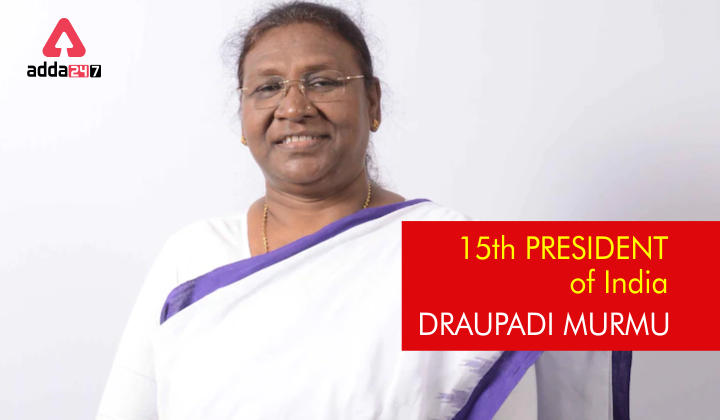Table of Contents
15th President of India
15th President of India: Draupadi Murmu, a tribal leader and former Jharkhand Governor, has been elected as the 15th President of India. The presidential election results were announced on 21st July 2022. With this, Draupadi Murmu has become the 2nd women President of India and the first tribal woman President of India. The BJP nominated Draupadi Murmu as the National Democratic Alliance’s candidate for President of India for the 2022 election in June 2022. As part of her presidential campaign for 2022, she visited various States to see support for her candidature from BJP lawmakers and other opposition parties. As a part of a campaign, she visited not Eastern states the JMM party of Jharkhand, BJD of Odisha, Shivsena of Maharashtra, BSP of Uttar Pradesh, JDS of Karnataka, and many other prominent opposition parties.
Draupadi Murmu – Biography
| Name | Draupadi Murmu |
| Born | June 20, 1958 |
| Birth Place | Uparbeda, Mayurbhanj, Odisha, India |
| Age | 64 years |
| Parents | Biranchi Narayan Tudu |
| Category | Scheduled Tribe |
| Ethnicity | Santhal Tribe |
| Spouse | Shyam Charan Murmu (passed away in 2014) |
| Marital Status | Widow |
| School | K.B. HS Uparbeda School, Mayurbhanj |
| College | Ramadevi Women’s University, Bhubaneshwar, Odisha |
| Children | Itishri Murmu |
| Political Party | Bhartiya Janata Party |
| Previous Offices | Governor of Jharkhand, Minister of State for Fisheries and Animal, Minister of State for Commerce and Transport, Member of the Odisha Legislative Assembly |
| Awards | Nilkantha Award for Best MLA in 2007 |
Draupadi Murmu – Personal Life
Draupadi Murmu was born in a Santal tribal family on June 20, 1958, in Uparbeda village of Mayurbhanj district in Odisha. Both her father, Biranchi Narayan Tudu, and grandfather were elected as sarpanch under the Panchayati Raj system. Draupadi Murmu married Shyam Charan Murmu, a banker, who died in 2014. The couple had two sons, both of whom are dead, and a daughter. She lost her husband, two sons, mother, and a brother in a span of 7 years, from 2009 to 2015. Spiritually Murmu has been associated with the Brahma Kumaris.
Draupadi Murmu – Education & Teaching Career
Draupadi Murmu is an arts graduate of Rama Devi Women’s College. She was appointed as a junior assistant in the Odisha Irrigation Department after serving as an honorary assistant professor at Shri Aurobindo Integral Education and Research in Rairangpur. Murmu started out as a school teacher before entering state politics. She worked as an assistant professor at the Shri Aurobindo Integral Education and Research Institute, Rairangpur and junior assistant at irrigation department Government of Odisha.
Draupadi Murmu – Political Career
Murmu joined the Bharatiya Janata Party (BJP) in 1997 and was elected as the councillor of the Rairangpur Nagar Panchayat. Murmu became the Chairperson of Rairangpur Nagar Panchayat in 2000. During the BJP and Biju Janata Dal coalition government in Odisha, she was the Minister of State with Independent Charge for Commerce and Transportation from March 6, 2000, to August 6, 2002, and Fisheries and Animal Resources Development from August 6, 2002, to May 16, 2004. Murmu took oath as the Governor of Jharkhand on 18 May 2015, becoming the first woman Governor of Jharkhand. As Governor in 2017, Murmu had refused to give assent to a bill approved by the Jharkhand Legislative Assembly seeking amendments to the Chhotanagpur Tenancy Act, 1908, and the Santhal Pargana Tenancy Act, 1949. The bill sought to give rights to tribals to make commercial use of their land, while ensuring that the ownership of land does not change. Murmu sought an explanation from the Raghubar Das-led BJP government about the changes it would bring for the well-being of tribals.
Election of President of India
- Pre-requisite for the Election of President:
- The nomination of a candidate for election to the office of President must be subscribed by at least 50 electors as proposers and 50 electors as seconders.
- Every candidate has to make a security deposit of Rs. 15,000 in the RBI, which is liable to be forfeited in case the candidate fails to secure one-sixth of the votes polled.
- Principle of Election for President of India: The election of the President of India is based on the principle of Proportional Representation by means of a single transferable vote.
- Voting Method for the Election of President of India: It is a secret ballot system of voting.
- Electoral College for the Election of President of India: Article 54 states that the President of India shall be elected by the members of an electoral college consisting of-
- The elected members of both Houses of Parliament; and
- The elected members of the Legislative Assemblies of the States.
- Note: For the purpose of Article 54 and Article 55, “State” includes the National Capital Territory of Delhi and the Union territory of Pondicherry.
- Resolution of Disputes in Election of President: Any dispute related to the election of the President is taken up by the Supreme Court which has original jurisdiction in this case.
- In this case, SC’s decision is final.
- Note: After the election of the President is declared null and void, the acts done by the President in his office remain valid even after his removal.
Who can vote in the Election of President of India?
The President of India is elected by the Members of an Electoral College consisting of-
- From Parliament: The elected members of both Houses of Parliament and
- From State Legislature: The elected members of the Legislative Assemblies of the States.
- From UTs: The elected members of the National Capital Territory of Delhi and the Union Territory of Puducherry vide the Constitution (Seventieth Amendment) Act, 1992.
Who can’t vote in the Presidential Election 2022?
The following group of people is not part of the electoral college responsible for electing the President of India:
- From Parliament: Nominated Members of Lok Sabha (2) and Rajya Sabha (12)
- From State Legislatures: Nominated Members of State Legislative Assemblies
- Members of Legislative Councils (Both elected and nominated) in bicameral legislatures
- From UTs: Nominated Members of union territories of Delhi and Puducherry.




 TSPSC Group 1 Question Paper 2024, Downl...
TSPSC Group 1 Question Paper 2024, Downl...
 TSPSC Group 1 Answer key 2024 Out, Downl...
TSPSC Group 1 Answer key 2024 Out, Downl...
 UPSC Prelims 2024 Question Paper, Downlo...
UPSC Prelims 2024 Question Paper, Downlo...




